Tired all the time? Grumpy with everyone and everything? Improving your sleep is the first step in self care – so here’s some top tips to sleep better tonight – tested by teachers!
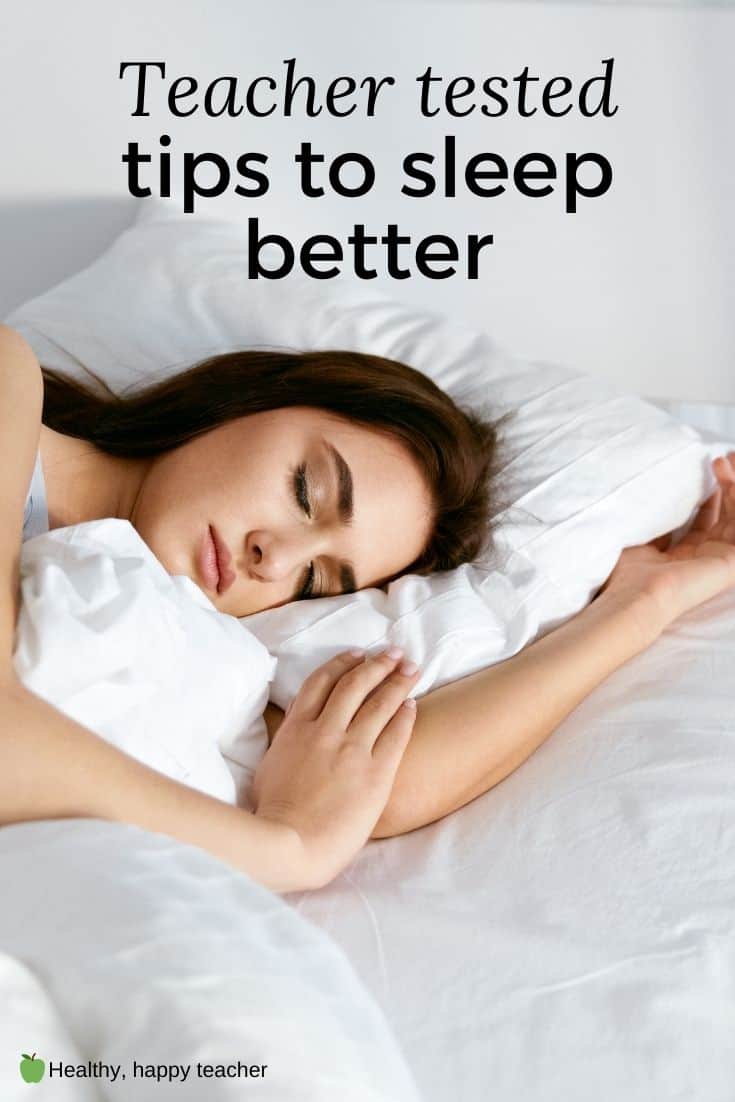
It’s a familiar story. You’re on your laptop working late into the night, trying to finish grading those papers so you can hand them back to the students tomorrow.
You complete the last one, and make the fatal mistake of checking your email.
Your heart starts pounding as you read an angry email from a parent. It’s blindsided you, and you go to respond, before closing your eyes, taking a deep breath, and turning off your laptop.
There’s nothing to be gained by replying tonight, but even so, as you lie in bed, you can’t sleep.
Not only are the thoughts of that email bothering you, but you’re so wired from working so late, your brain just won’t shut off.
Sound like a familiar story?
I know – because that was me once.
Then I hit my 40s and I couldn’t bounce back from a lack of sleep like I used to, so I made the decision to prioritize sleep over working late, watching tv, or any other late night activity (except for the fun stuff).
These tips to sleep better will help you set your body up to anticipate sleep, so that by the time the lights go out, your mind is calm and still and your body is rested.
Try doing them in order for a bedtime routine that can’t be beat!
Table of Contents
Power down
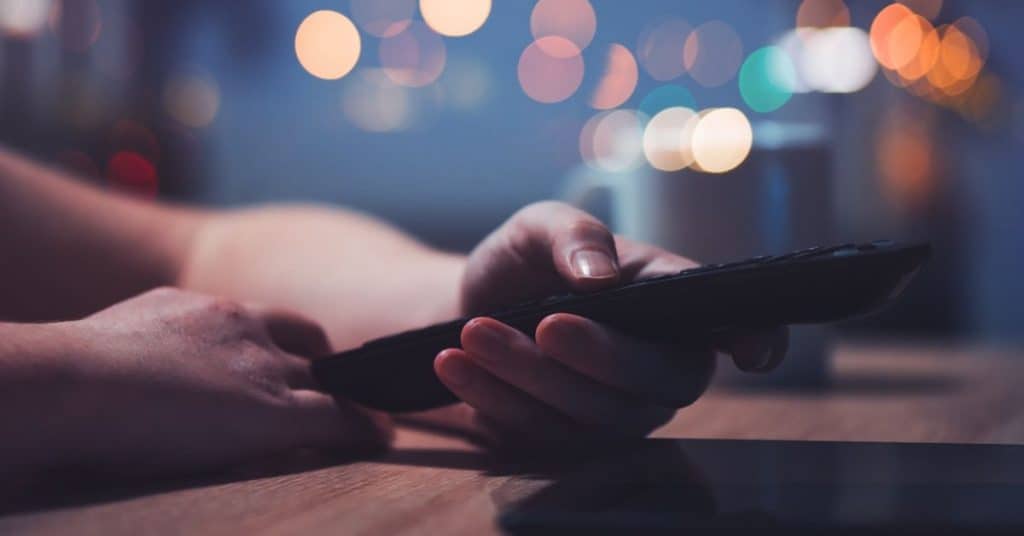
30 minutes before you go to bed / one hour before you go to sleep is time to make the first step towards sleep.
Put your phone away.
Turn off your computer – the television too if you can.
Even consider dimming the lights
These devices all emit blue light.
Now like many things, blue light can be good or bad depending on the context.
Blue light wavelengths produced by electronics and overhead lights boost attention, reaction times and mood (source), which is a positive thing – at day time.
At night time – not so much.
Say goodbye to your electronics as the first step towards better sleep.
Set a bedtime alarm
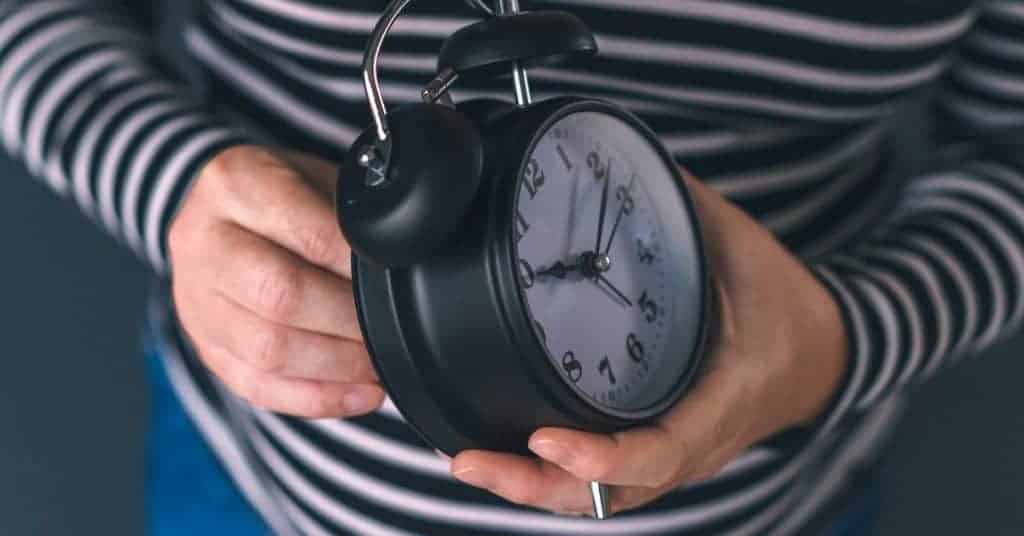
If you’re serious about getting a good night’s sleep then the first thing you need to do is go to bed at the same time every night.
To do this, you’ll first need to work out how much sleep you need.
I did this by testing how I felt at eight hours, seven hours, six hours and then narrowing down further until I hit my best time.
That best time for me is seven and a half hours.
Now I try to get up at the same time every day, which is at 5 am, so that means I need to be asleep by 9:30 at the latest.
And is that super hard!
We eat dinner around 6 pm every night so that by the time 7 pm runs around, we’ve eaten and tidied up. That’s when I have my last two hours of productive work time. My husband works in this time slot as well.
So 9 pm always used to be the start of that magical 30 minutes to an hour before we went to sleep where we talked, watched a show, or just chilled.
Now it heralds time to pack up everything and go to bed.
I cannot make myself do this easily, so setting a bedtime alarm is a must.
I had one on my watch but it is way too easy to turn that off.
So I recommend having it on your phone which should be plugged in and charging over the other side of your room – not in your bedroom.
Put on the air conditioning in summer
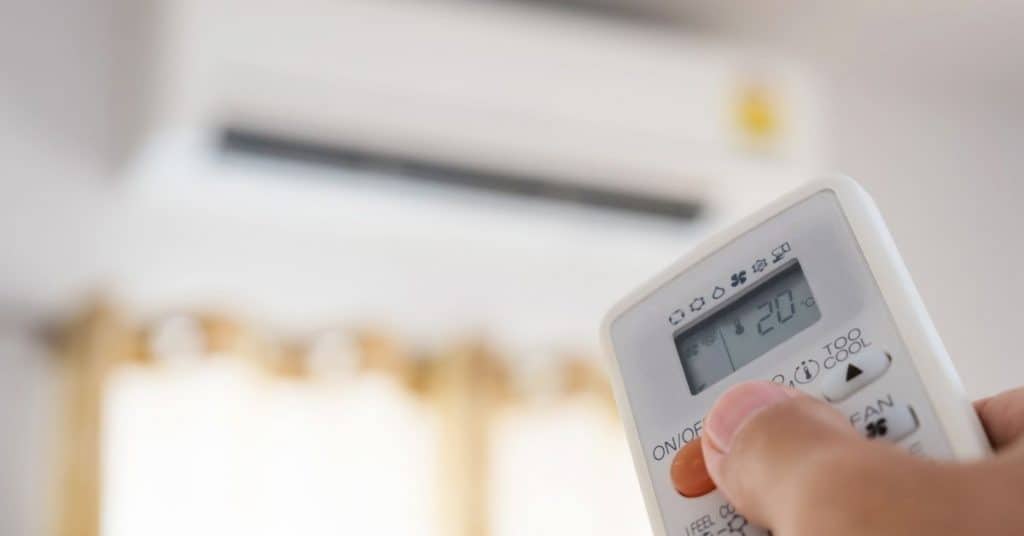
We have central air conditioning. On summer night’s we don’t use it too much – it’s expensive to run and it’s generally okay to be a little on the warm side in the evening.
However when we transition from the living area to the bedroom it’s way too hot.
The best temperature to sleep in is between 60 and 67 degrees Fahrenheit (source).
Therefore 30 minutes before we go to bed, the air conditioning goes on to chill everything down.
If you don’t have air-conditioning, my personally tested top tips to cool down at night include:
- keeping your curtains / blinds / shutters closed during the day to avoid the room getting too hot in the first place
- spraying your sheets with cold water
- having a cool shower
- sleeping in a wet t shirt (done one night out of desperation when renting a stinking hot place with budget insulation)
- sleeping with a window open (but safety first)
- sleeping with your bedroom door open
Turn on your bedside lamps
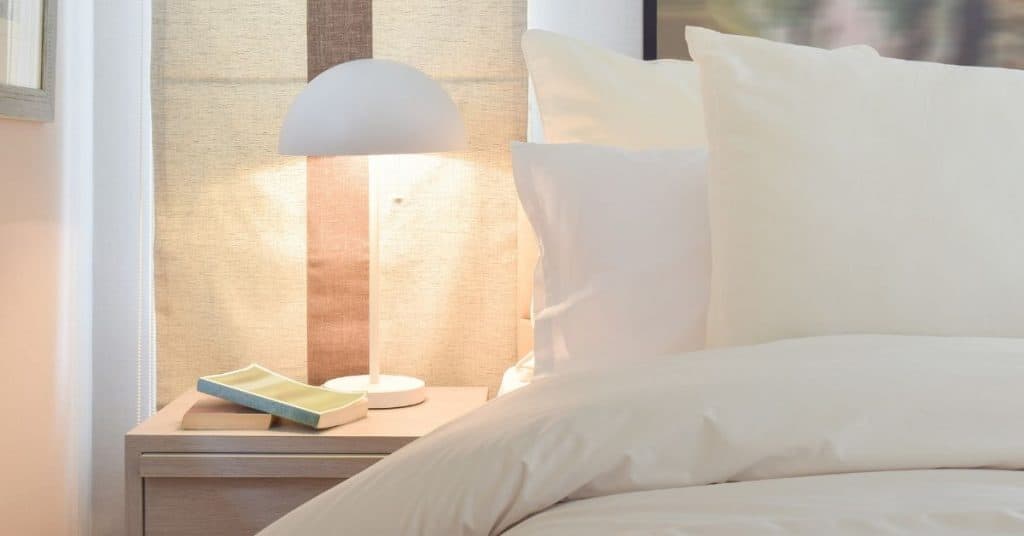
Other than the fact it looks cozy and inviting, there’s another reason why it’s important to not have the main bedroom lights blaring, and that is because, just like the blue light we mentioned above, too much light stops your body producing the right amount of melatonin.
Melatonin regulates the sleep / wake cycle. It increases with darkness and decreases with light, so you can see it is super important to create the right level of darkness when you intend to go to sleep.
Put a notebook next to your bed
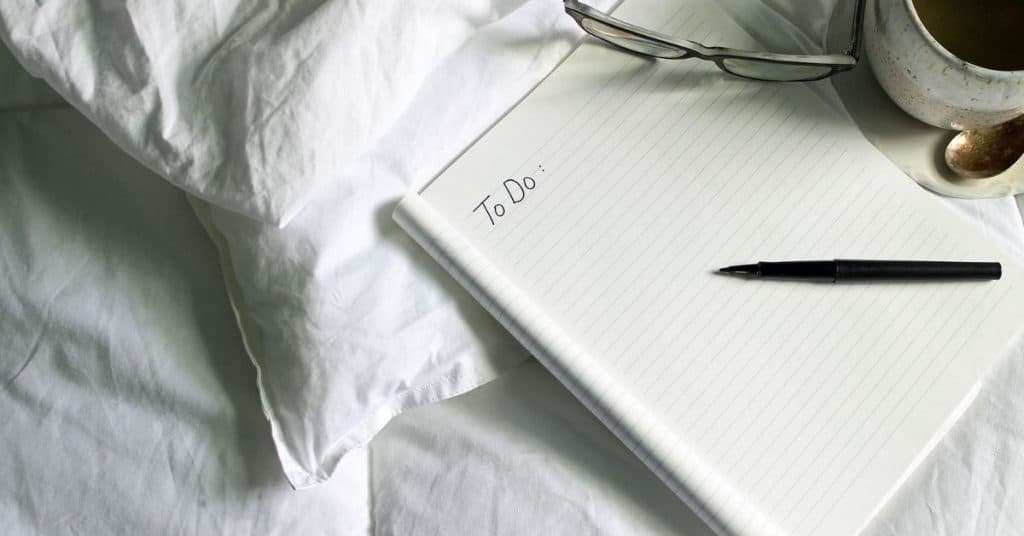
Put a notebook next to your bed, or if you keep a bullet journal use this.
Make sure you have a pen there as well.
This is to prevent those late night “OMG”s, when you remember that you need to book the dog into the vet for its vaccinations, or to shift that hair appointment.
And like all things, you’ll probably find that since you have planned for it, you won’t need it.
Do the practical things
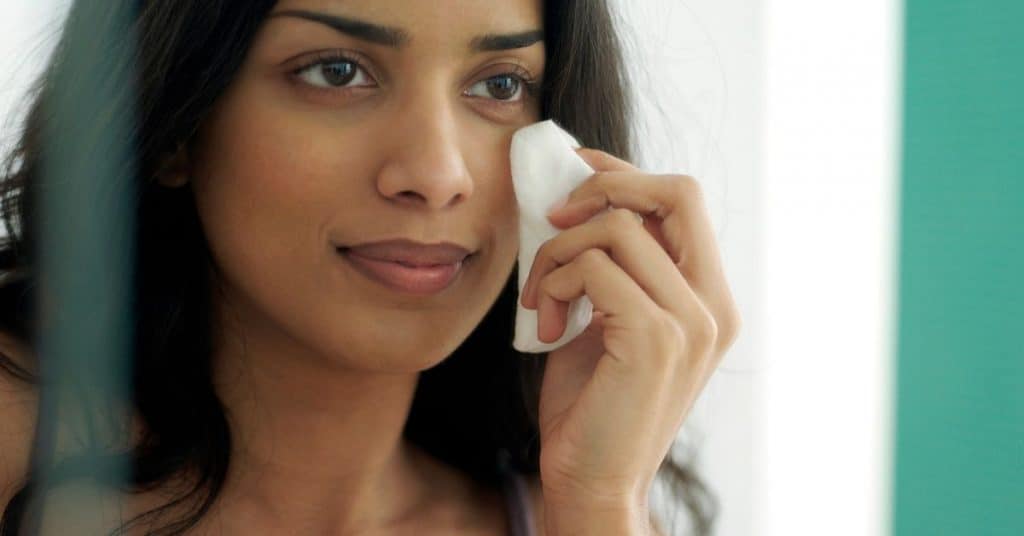
This is now the time to do all the practical things.
- have a shower
- remove your makeup
- moisturize
- brush your teeth
- go to the toilet
- get into your pajamas
…whatever you need to do to physically clean yourself of the day.
Have a calming ritual
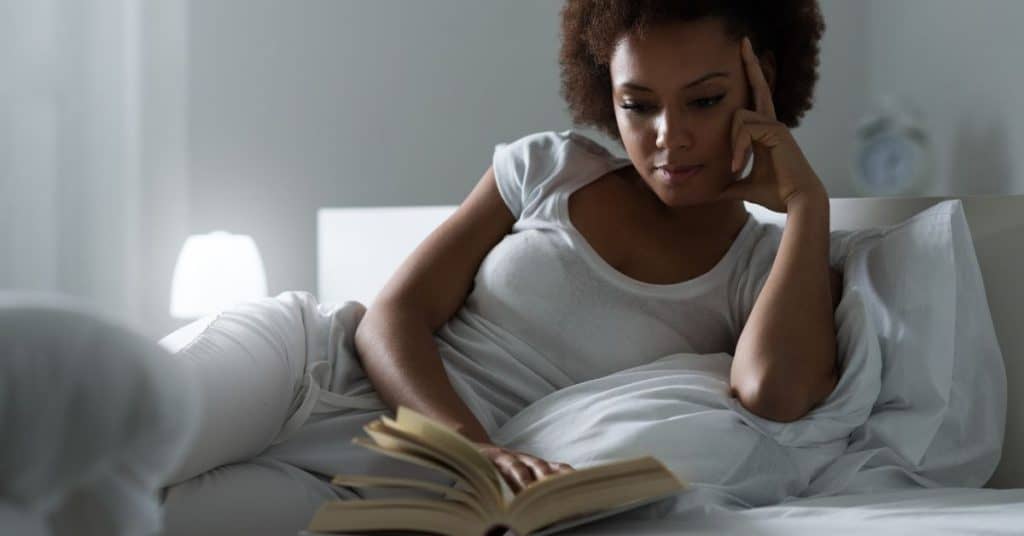
Just as you have physically prepared yourself for sleep, now its time to mentally prepare yourself by doing one or more of these calming activities:
- meditate
- practice deep breathing
- record what you’re grateful for
- complete a one sentence reflection on the day
- read
- lie on your acupressure mat (I bought mine almost 5 years ago and it changed my sleep forever)
- listen to soothing music
- pray
- visualize
Now it’s time to turn off the lights, close your eyes and fall asleep!
But before we wrap up, here’s the answers to some common questions you might be asking yourself.
What’s a good bedtime routine for anxiety?
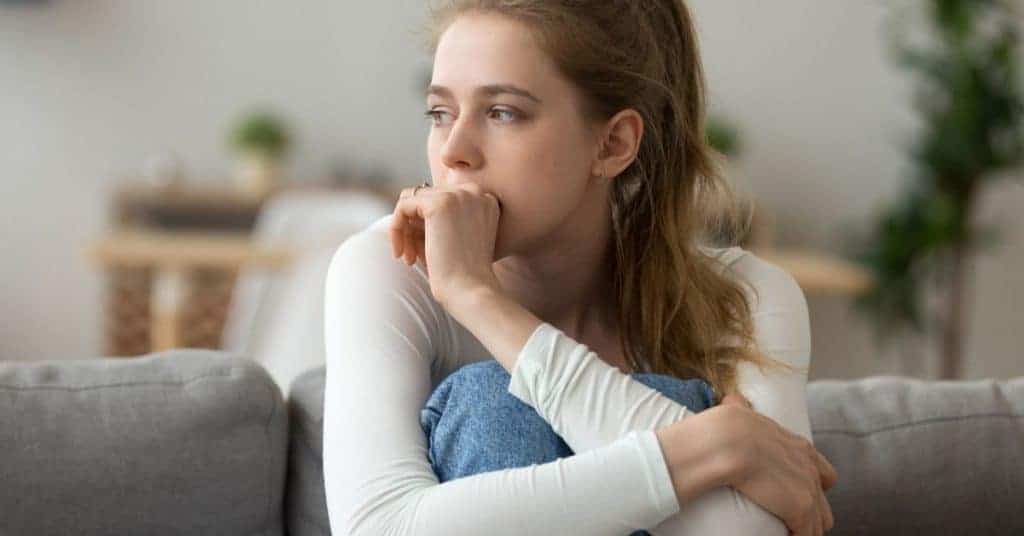
Creating a good sleep routine as outlined above will benefit those of you with anxiety.
However please note that this does not substitute for any medical advice.
As someone who took sleeping pills for many years, I can tell you sleep and anxiety is a vicious cycle.
The fear of not being able to get to sleep is all consuming and night time becomes exquisite torture.
If your anxiety is affecting your sleep to the point that nothing you try is working, you should consult a medical professional.
In addition to the above, you could consider adding the use of essential oils to your bedtime routine.
You could use a diffuser, burner, or sprinkle drops on your pillow.
These are the best essential oils for sleep.
You could also add drops to a bath.
Other tips include
- engaging in exercise earlier in the day
- compartmentalizing your “worries” – allowing yourself only a scheduled period of time to ruminate on a problem
- not consuming excessive amount of alcohol to help yourself “relax”
What is a normal bedtime for adults?
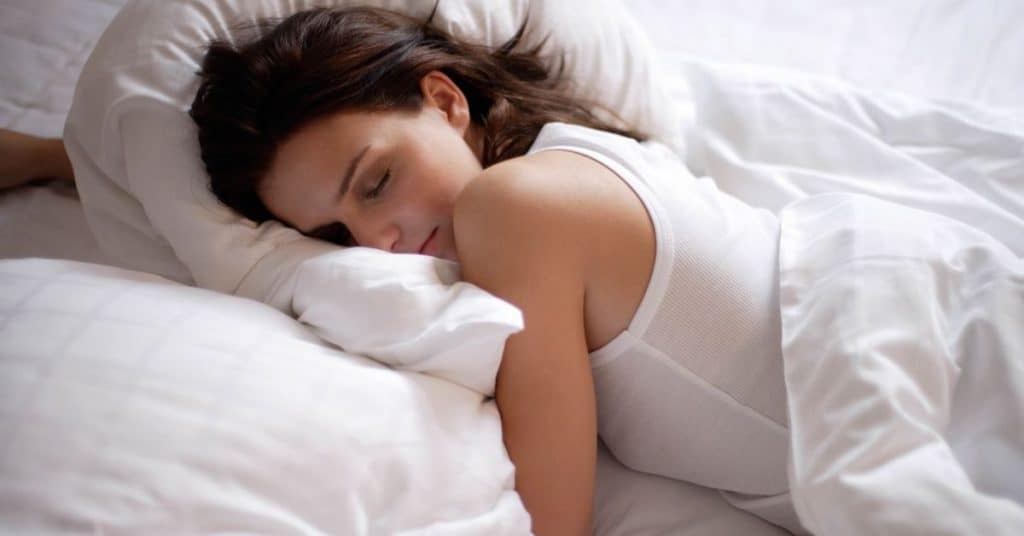
Any time between 9 pm and 12 am could be considered “normal.”
Attempting to sleep when it’s dark outside will be much easier than if the sun is still shining (location dependent of course!).
Getting to sleep after midnight can be counterproductive.
That’s because we tend to have more deep sleep in the earlier part of the night and more REM sleep in the later part of the night, regardless of what time we go to sleep (source).
So if you go to sleep at 1 am, 2 am or later, you’ll miss out on that super restorative deep sleep you need to be refreshed.
(Funnily enough, I had observed this myself on a smaller scale on my Fitbit and not realized why until researching this article!).
In addition, it’s fairly universally accepted that a minimum of seven hours of sleep and a maximum of nine is what’s needed for most adults, and a bedtime between those hours can generally make that happen.
What works for you will depend whether you function best in the morning or the evening.
Early birds might wish to go to sleep at 9 pm so they can be awake by 5 am and get their eight hours in.
Night owls might go to sleep at midnight and wake up at 7 pm.
Everybody wins!
What time at night should I stop eating?

Again, this depends on what time you’re planning on going to bed and ultimately what you feel comfortable with.
There’s arguments to be found for not eating three or so hours before a meal.
There’s alternative arguments that if you’re too hungry you won’t sleep.
Personally, consuming all my food by 7 pm means I’m not going to bed feeling bloated or full.
Interestingly, one study showed that not eating after 7 pm caused participants to lose weight more than when they were able to eat after 7 pm (where they actually gained weight) (source).
However if for some odd reason (like we’ve been out) we’re still up at 11 I start to feel super hungry.
Because my decision making / willpower is fatigued by this time it’s when I’ll want to make unhealthy choices that will also interfere with my ability to sleep well.
Therefore I know that stopping eating by 7 pm (including my nightly cup of tea) works well for me, and if for some reason I will have a late night, I need to actively plan for this so I pick a light option.
How long before bed should I stop drinking caffeine?

Based on the findings of the Journal of Clinical Sleep Medicine, the answer is at least six hours before you go to bed.
Their study tested the effects of 400 mg of caffeine, when taken zero, three or six hours before bed, on sleep.
They found that caffeine consumption of this level “significantly disrupts sleep. Even at 6 hours, caffeine reduced sleep by more than 1 hour” (source).
Now I’m sure you’re asking well how much caffeine is in a cup of coffee, and the answer annoyingly is that it varies widely.
Instant coffee, brewed coffee, espresso – they all contain different amounts both within and between their sub-type.
However it is likely that to get 400mg you’d be looking at more than one cup of joe.
Yet given the varying range, play it safe and follow the six hour rule.
To sum up
These tips to sleep better are great ways to support yourself to get much needed sleep.
As I suggested, try doing them all in sequence for a bedtime routine that sets you up for success. Like so many things in life, you need to actively create systems and structures that enable you to achieve your goals – not leave them up to chance.
Leave a Reply